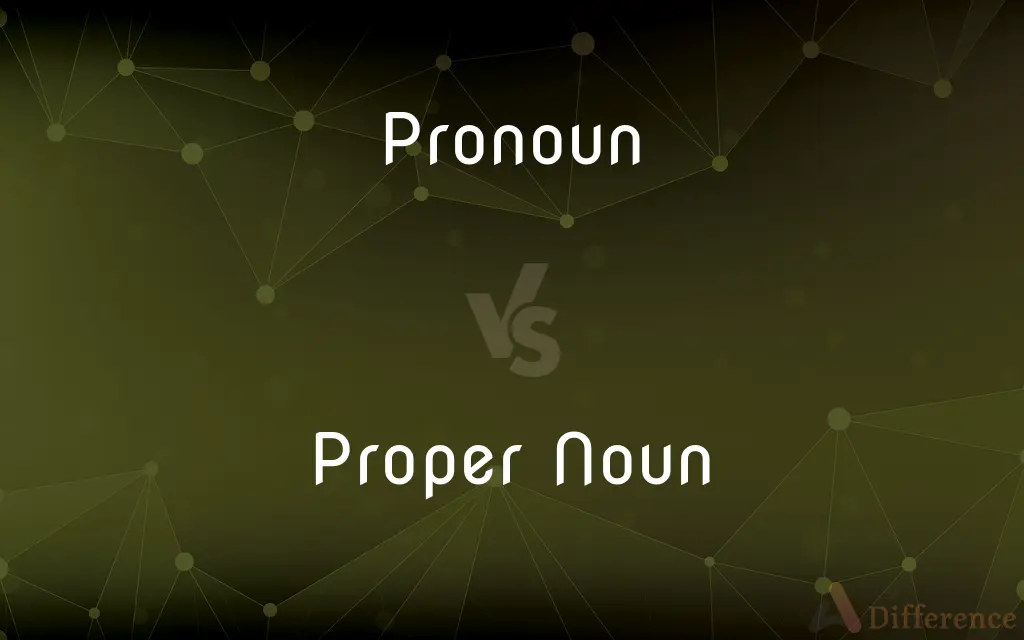Pronoun vs. Proper Noun — What's the Difference?
Edited by Tayyaba Rehman — By Fiza Rafique — Published on December 6, 2023
A Pronoun replaces a noun to avoid repetition; a Proper Noun is a specific name for a particular person, place, or thing.

Difference Between Pronoun and Proper Noun
Table of Contents
ADVERTISEMENT
Key Differences
A Pronoun is a word used in place of a noun, eliminating the need to mention the noun repeatedly. On the other hand, a Proper Noun designates a unique entity, such as a specific person, place, or organization.
When reading a text, Pronouns like 'he,' 'she,' 'it,' and 'they' help maintain flow by substituting nouns previously mentioned. Meanwhile, Proper Nouns always start with a capital letter, signaling the importance or uniqueness of the entity they represent.
Using Pronouns effectively can make a sentence or paragraph more concise, preventing redundancy. In contrast, Proper Nouns provide clarity and specificity, ensuring readers know exactly what or whom is being referenced.
In the English language, there are various types of Pronouns, including personal, demonstrative, and relative. Conversely, Proper Nouns can range from brand names like 'Nike' to historical figures like 'Abraham Lincoln.'
Both Pronouns and Proper Nouns play critical roles in sentence construction. While Pronouns ensure fluidity and coherence, Proper Nouns provide the exactness needed for clear understanding.
ADVERTISEMENT
Comparison Chart
Definition
Replaces a noun to avoid repetition
Specific name for a particular entity
Capitalization
Typically starts with a lowercase letter
Always starts with a capital letter
Examples
He, she, they, it
New York, Apple, Shakespeare, Christmas
Purpose
Adds fluidity and prevents redundancy
Offers specificity and distinction
Types/Varieties
Personal, demonstrative, relative, etc.
Names of people, places, brands, events, etc.
Compare with Definitions
Pronoun
Represents both singular and plural entities.
They are coming to the party
Proper Noun
Not preceded by articles 'a' or 'an.'
I visited Paris, not a Paris.
Pronoun
Used to avoid repeating the same noun.
Mary said that she would come.
Proper Noun
Distinguishes one entity from others of its kind.
While many people are named John, only one was John F. Kennedy.
Pronoun
Can be subjective, objective, or possessive.
He gave it to her.
Proper Noun
Identifies unique persons, places, or things.
Mozart was a prolific composer.
Pronoun
A word that takes the place of a noun.
She is my best friend.
Proper Noun
The specific name of an individual or entity.
London is a beautiful city.
Pronoun
The part of speech that substitutes for nouns or noun phrases and designates persons or things asked for, previously specified, or understood from the context.
Proper Noun
Always begins with a capital letter.
We visited the Grand Canyon last summer.
Pronoun
Any of the words within this part of speech, such as he or whom.
Pronoun
(grammar) A type of word that refers anaphorically to a noun or noun phrase, but which cannot ordinarily be preceded by a determiner and rarely takes an attributive adjective.
Pronoun
Any of the pronouns by which a person prefers to be described, typically reflecting gender identity.
My pronouns are she/her.
Pronoun
A word used instead of a noun or name, to avoid the repetition of it. The personal pronouns in English are I, thou or you, he, she, it, we, ye, and they.
Pronoun
A function word that is used in place of a noun or noun phrase
Pronoun
Can be demonstrative or relative.
This is what I wanted.
Common Curiosities
What is the primary role of a Pronoun?
A Pronoun replaces a noun to avoid repetition.
How does a Proper Noun differ from a common noun?
A Proper Noun is the specific name of a unique entity and is always capitalized.
Why do Proper Nouns always start with a capital letter?
It signifies the importance or uniqueness of the entity they represent.
Is 'Mississippi River' a Pronoun or Proper Noun?
'Mississippi River' is a Proper Noun.
Do all languages use Proper Nouns in the same way as English?
While the concept of Proper Nouns exists in many languages, rules and conventions might differ.
Which word type, Pronoun or Proper Noun, can be possessive?
Both can be possessive, e.g., Pronoun: "hers"; Proper Noun: "America's."
Can the word 'I' be considered a Pronoun?
Yes, 'I' is a personal Pronoun.
Can a Pronoun stand for a Proper Noun?
Yes, a Pronoun can replace a Proper Noun, e.g., "Sarah is kind. She helps everyone."
How can I distinguish a Pronoun from other word types?
Pronouns replace nouns and typically don't start with a capital letter unless at the beginning of a sentence.
Can a Proper Noun ever be in lowercase?
No, Proper Nouns are always capitalized.
Are brand names considered Proper Nouns?
Yes, brand names like 'Nike' or 'Apple' are Proper Nouns.
Why is the use of Pronouns important in writing?
They make writing more fluid and prevent excessive repetition of nouns.
Are there different kinds of Pronouns?
Yes, there are various types, including personal, demonstrative, and relative.
Which word, Pronoun or Proper Noun, would 'they' be classified as?
'They' is a Pronoun.
Can a Proper Noun ever function as a Pronoun?
No, a Proper Noun is a specific name, while a Pronoun replaces a noun.
Share Your Discovery

Previous Comparison
Hotels vs. Resorts
Next Comparison
T-Test vs. P-ValueAuthor Spotlight
Written by
Fiza RafiqueFiza Rafique is a skilled content writer at AskDifference.com, where she meticulously refines and enhances written pieces. Drawing from her vast editorial expertise, Fiza ensures clarity, accuracy, and precision in every article. Passionate about language, she continually seeks to elevate the quality of content for readers worldwide.
Edited by
Tayyaba RehmanTayyaba Rehman is a distinguished writer, currently serving as a primary contributor to askdifference.com. As a researcher in semantics and etymology, Tayyaba's passion for the complexity of languages and their distinctions has found a perfect home on the platform. Tayyaba delves into the intricacies of language, distinguishing between commonly confused words and phrases, thereby providing clarity for readers worldwide.
















































